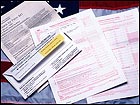|
Your Taxes: Contributions
|
 |
December 21, 2001: 5:04 p.m. ET
A holiday season guide to deductible donations for individuals.
By Gary Klott
|
NEW YORK (Tribune Media Services) - This is the time of year when charities count on people to be inspired by the spirit of the holiday season and the lure of year-end tax deductions to dig deep into their pockets to help worthy causes.
How much you'll be rewarded next tax season for your generosity this holiday season will depend on how much you give, the type of donation you make and whether you end up claiming the standard deduction or itemizing your deductions. Charitable contributions can be written off only if you itemize.
Here is a guide to how much of a deduction you can expect from the most common forms of holiday giving and how to get the maximum tax benefit for your generosity.
Cash contributions
Cash contributions are straightforward. Whether you drop a few dollars in the church collection basket at Christmas or send your alma mater a large check, you'll generally be able to deduct the full amount of your contribution.
Donate investments
If you're planning to make a sizable contribution, consider donating stocks, mutual fund shares or other investments that have gone up in value. You'll get a bigger tax break than you would by giving cash. Besides getting a charitable deduction for the current market value of your shares, you'll escape capital gains tax on the appreciation.
The process is simple. "Most of the established charities have their own broker accounts, and it's a matter of just telling your broker to transfer X number of shares over to the charity's broker," said David Rhine, regional director of family wealth planning at Sagemark Consulting, a financial planning firm in Rochelle Park, N.J.
Be sure to donate only shares that you've owned more than one year. If you donate shares held one year or less, your charitable deduction will be limited to what you originally paid for them -- not their appreciated value.
Another caution: Don't donate shares that are selling for less than you paid for them. The only way you can claim a capital loss for those shares on your tax return is to sell them yourself. If you give the shares directly to charity, you won't be eligible to deduct the loss.
Used items
If you're donating old clothing, furniture or other used items to groups that help the needy, you'll generally be eligible to deduct what the goods would sell for in a consignment or thrift shop.
Most charities will give you a receipt with a very brief description of your donation, such as "three bags of clothes." But to better substantiate deductions in case the IRS raises questions, many tax advisers recommend making up a detailed list of the donated items.
"Be specific as to what you gave and the condition it was in, especially if you gave high-value items," said Thomas Pudner, personal financial planning manager at the accounting firm of KPMG in McLean, Va.
Fundraising events
If you buy a ticket to a holiday fund-raiser, such as a benefit concert or charity ball, you won't be able to deduct the full price of admission. When figuring your charitable deduction, you'll need to subtract the value of any benefit received, such as food and entertainment at the event.
For example, say you buy a $90 ticket to a fund-raising banquet. If the value of the meal is estimated at $50, you'd be able to deduct only $40 of the ticket's cost.
There is one exception. If you buy a ticket but don't attend the event, you can deduct the full cost of the ticket provided you return the ticket to the charity before the event.
Gift shopping
Many charities operate gift shops and hold holiday bazaars or auctions to raise funds. But you generally won't earn any tax deductions for your purchases.
The reason is that the tax law allows a deduction only if you pay more for an item than it normally sells for.
For example, say you attend a silent auction at your church and you submit the winning bid for a weekend stay at a spa valued at $300. If you pay $300 or less for it, you won't be entitled to any deduction. But if you overbid to help the church and pay $350, you'd be eligible to deduct $50 - the amount by which your payment exceeds the fair market value of the spa stay.
Volunteer work
Volunteering your personal services may be one of the most valuable contributions you can make to a charity. But the tax law doesn't allow any charitable deduction for the value of your time or labor.
Nevertheless, be sure to keep receipts and other records of any expenses you incur, such as transportation and long-distance phone calls. Out-of-pocket volunteer expenses qualify for the charitable deduction.
Gifts to individuals
The holiday season inspires many people to look for ways to help particular individuals in need, be it a neighbor who has been out of work for many months or a family that can't afford to buy Christmas presents for their children.
But be aware that no matter how needy or deserving they may be, contributions to individuals aren't deductible. Only donations made to qualified charitable organizations are eligible for the charitable deduction. 
|
|
|
|
|
|

|

